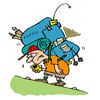
I grew up in the 1960s and ’70s in Squirrel Hill, a predominantly Jewish, affluent neighborhood in Pittsburgh. I had strong Jewish feelings, yet the religion I experienced in our temple felt like, well, nothing. I have no bad or painful memories of it. Saturday school was where you went every Saturday morning to decide where you were going to go shopping on Saturday afternoon.
I remember being in the main sanctuary looking at these huge, ornate, stained glass windows, the light beaming through the chiseled features of our holy I was asking myself questions about the meaning of lifeforefathers, and thinking, “Wow, these guys are old!” I mean, everything around me indicated that the whole purpose of life was to “have it good”—good grades to get into a good college to get a good job so you could wear good clothes, etc., etc. What could these shepherds with their long beards and flowing robes possibly teach me about all that?
And yet there was a part of me, a very real and very vocal part, that understood that there was much more to life. There had to be—I just didn't know what.
For as long as I can remember, I was asking myself questions about the meaning of life and why I was here. I was particularly haunted by the sight of children in wheelchairs. What in the world could those kids have done to deserve such a fate? In my childishness, I assumed they were being punished, a thought that terrified me, even became obsessive for me. Surely I was worthy of punishment for my many misdeeds (torturing my Saturday school teachers, for one). Why was it that these children couldn't walk and my biggest worry was whether or not my mother would let me get Pappagallo shoes?
As I grew older, I focused less on my quest for existential meaning and accepted the fact that having the right friends, the right achievements—the right stuff—might just be all there would be to my lucky little life. I performed respectably in all these areas, but I secretly yearned for something true and lasting that would give my life direction and purpose.
I attended college at the University of Michigan (no answers there), had a brief stint back home as an advertising copywriter (please tell me I was created to do more than write about aluminum screws), got an MBA (no answers, but at least more money), and then, at age 25, married. When it came to pairing me with my husband, Zev, G‑d was looking out for me big time.
Next came the dog, then the kids. Jewish philanthropy was a natural next step. I didn't consider myself to be particularly charitable by nature, but “helping less fortunate Jews” felt like the best way to show my gratitude for being able to enjoy my dog and two kids in a country that wasn't persecuting me.
As I climbed the ladder of “young leadership” in the world of Jewish philanthropy, I began to realize how much I was lacking in my Jewish education. The watershed moment came at a United Jewish Federation Young Women's Cabinet Retreat. I was watching a video about Soviet Jews willing to risk a one-way ticket to Siberia for the privilege of having a bar mitzvah or being married under a chuppah. The tears began to flow uncontrollably as I confronted my Jewish self, guilty as charged: I did nothing because I knew nothing.
I made up my mind then and there to at least learn what could be so compelling about Jewish observance. My husband and I were soon enrolled in an elite, intensive class sponsored by billionaire philanthropist Leslie Wexner, who saw the gaping hole in knowledge of our people's history, religion and culture among young Jewish decision-makers. He spared no expense, recruiting the best and the brightest to enlighten the chosen few who committed to sit around a conference table for four hours every other week for two years. Talmudic genius Adin Steinsaltz traveled from Israel just to explain to us the kosher way to fold a document for a bill of divorce. (“Excuse me,” asked one of the more outspoken and still unaffected participants, “why do we care?”)
But I desperately wanted to care, just to be able to give my children better answers in case they had inherited the gene predisposing them to question the meaning of life, or even if they just wanted to know what it meant to be a Jew.
In the spring of 1987, during one of our Wexner sessions, one of the participants told the rest of us about a Shabbat retreat with a Chabad rabbi by the name of Sholom Lipskar. Nobody else looked too interested, but all I needed to hear was that there was free babysitting in a country setting, and I was in. With our two small children in tow, my husband and I went on the retreat that changed our lives.
It almost didn't happen though. Only moments after settling into our cabin to unpack, my husband spotted Rabbi Lipskar walking down the path outside. We hurried to introduce ourselves. I was particularly eager, since I was chair of the UJF's Business and Professional Division, and Rabbi Lipskar would be speaking to the group following the Shabbaton. I extended my hand confidently, but he politely refused to shake it. I was totally humiliated—I had no idea about the Jewish law prohibiting men and women (who are not married to each other) from touching. I went back to our cabin and became hysterical.
“That's it—we’re leaving,” I announced to my husband. I was serious. I had tried to give the Orthodox a chance, and they didn't even say hello like the rest of the world! But Zev convinced me to stay. Once I overcame my embarrassment and started listening, I realized that these people were talking about what I like to talk about: G‑d, why we are here, and the meaning of life. By the end of the weekend, I felt as though I had won the spiritual lottery.
I felt as though I had won the spiritual lottery What was so compelling about what I learned, what inspired me to change my whole life, was the notion that the world is waiting for the imminent arrival of Moshiach, the Messiah, who will conclude this long and painful love story between G‑d and the Jewish people and thereby solve the existential mystery called “life as we know it.” There was just one eensy-weensy detail, they added: learning Torah and doing mitzvahs are the super-fuel that hasten the Messiah’s arrival.
I took a deep breath and a leap of faith.
My husband was also inspired by the retreat and agreed that Jewish observance was worth pursuing. He had always strongly identified as a Jew—in fact, when he was 13 and his Reform synagogue wasn't doing bar mitzvahs, he begged his parents to take him to a Conservative synagogue so that he could have one. He loved the land of Israel, and he loved the Jewish people. He was willing to go in for a little Jewish observance too.
The first step was the kosher kitchen. (You are what you eat, right?) The following week I met with Mrs. Miriam Nadoff, of blessed memory, who walked through my kitchen and told me what to do. The very notion that a stranger cared enough to help me keep kosher confirmed that we were making the right move. It didn't matter that we would have to give away practically new wedding dishes (they had been used three times but couldn't be made kosher), and a practically new dishwasher. I had finally found the club I wanted to join.
“What would it take for you to eat in my house?” I asked Mrs. Nadoff as we discussed how careful I was planning to be.
“I'll eat in your house when you keep Shabbat,” she answered gently.
And that was just the beginning of the changes we would have to make. Our kids adjusted well to no more Saturday cartoons. It was hard to believe that going to shul (synagogue) was becoming a reward instead of a punishment. I adopted the style of dress pretty readily, though I was determined to salvage a couple of pricey pantsuits by making them into skirt suits. (Not worth it—they didn’t look great and I couldn't walk in them.) The no-more-non-kosher-restaurants part was almost a deal-breaker though; I was a hopeless cook. But I was a good learner, and I had a new determination that could only have come from G‑d.
So, along with learning the aleph-beit like a first-grader so that I could one day pray like a big girl, I learned how to make challah. (I discovered that if you make good dips, the Shabbat guests fill up on bread and barely notice the rest of the meal.)
By the time our first Pesach rolled around, I had baby number three (now known as Izzy), and we were in pretty deep. More than once, too many times to count, really, I asked myself what I had gotten myself into. Besides the cooking and the babies (thank G‑d, we went on to have five daughters and four sons), there was the hard work of actually trying to be a mentsch, of trying to understand what G‑d wanted from me.
It has been a miraculous journey, one that I could never have foreseen and still can’t quite believe. Thank G‑d, the majority of our children are married now—most are emissaries of the Rebbe—and my oldest granddaughter tries to teach me Yiddish. Go figure.
Then again, I came into the world weighing 6 pounds, 13 ounces. There's an engraved picture frame in my parents' house that confirms this. Of course, the number “613” meant absolutely nothing to me until, in 1987, I heard that 613 was the exact number of mitzvahs in the Torah. I guess you could say that everything was meant to be.
Reprinted with permission from the N’shei Chabad Newsletter.





